Source: This is forwarded to you by the State of Texas State Operations Center (SOC).
Date: August 11, 2009
Subject: New traffic, criminal laws set to go into effect Sept. 1
HB 2730 is the DPS’s Sunset Legislation, and many of the DPS-related bills this session were included in HB 2730.
Notable traffic and criminal laws that go into effect on Sept. 1 (unless otherwise indicated) include*:
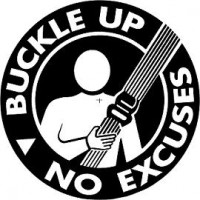 Seatbelts:
Seatbelts:
HB 537 requires all occupants of a vehicle, no matter their age, to be secured by a safety belt, no matter where they are seated in the vehicle; changes the definition of a passenger vehicle to include a passenger van designed to transport 15 or fewer passengers including the driver; removes the current exemption for third-party Medicaid transportation provisions regarding the use of child passenger safety seats; and prohibits a motorcycle operator from carrying a passenger under the age of 5 unless the child is seated in a sidecar attached to the motorcycle.
SB 61 amends the existing statute regarding child passenger safety seats. The bill requires that any child younger than 8 years of age be restrained in an approved child passenger safety seat unless the child is at least 4 feet, 9 inches in height. The fine is no more than $25 for a first offense and $250 for a second offense. The law also creates a new court cost for conviction of an offense under this section to be collected and used by TxDOT to buy safety seats for low income families. The law becomes effective on Sept. 1, 2009, but tickets for this offense cannot be issued until June 1, 2010. Police officers are allowed to issue a warning before that date.
Driving:
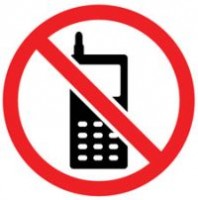 HB 55 makes it illegal to use a wireless communication device in a school zone unless the vehicle is stopped or a hands-free device is used. Cities or counties wanting to enforce this law must post a sign at the beginning of each school zone to inform drivers that using a wireless communications device is prohibited and the operator is subject to a fine. It is a defense to prosecution if the operator was making an emergency call.
HB 55 makes it illegal to use a wireless communication device in a school zone unless the vehicle is stopped or a hands-free device is used. Cities or counties wanting to enforce this law must post a sign at the beginning of each school zone to inform drivers that using a wireless communications device is prohibited and the operator is subject to a fine. It is a defense to prosecution if the operator was making an emergency call.
HB 2730 increases the penalties for driving while intoxicated with a child passenger by adding an automatic driver license suspension period for first-time offenders and an increased suspension period for repeat offenders. The driver license re-instatement fee for completing an education program will rise from $50 to $100. Closes a loophole so a person who commits an offense as a minor cannot circumvent the driver license penalty if the person turns 21 before their court date.
HB 2730 allows a new Texas resident to operate a vehicle without a Texas license for 90 days instead of the current 30. (This provision went into effect on June 19, 2009.)
HB 2012 creates two new punishment enhancements: a Class B misdemeanor if a person drives with a suspended license and without insurance; and a class A misdemeanor if the person driving without insurance or a valid driver license has an accident and someone is seriously injured or dies as a result of that accident.
SB 129 authorizes neighborhood electric vehicles (NEVs) to be operated on roads with a posted speed limit of 45 miles per hour or less. The bill authorizes driver license holders to operate NEVs without having a motorcycle endorsement, clarifies that drivers and passengers in such vehicles are not required to wear helmets and specifies that enclosed three-wheeled vehicles as described in the bill are authorized to operate in preferential lanes.
Concealed handgun:
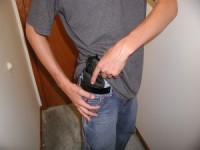 HB 2730 amends numerous provisions regarding concealed handgun licenses (CHLs), including eliminating student loan defaults as a disqualifier, to clarify that DPS must suspend or revoke a license when the licensee becomes ineligible and mandating that a magistrate suspend a CHL held by the subject of an emergency protective order.
HB 2730 amends numerous provisions regarding concealed handgun licenses (CHLs), including eliminating student loan defaults as a disqualifier, to clarify that DPS must suspend or revoke a license when the licensee becomes ineligible and mandating that a magistrate suspend a CHL held by the subject of an emergency protective order.
HB 2664 provides a defense to prosecution if a concealed handgun license holder carries a concealed handgun into an establishment that gets 51 percent or more of its income from the sale of alcoholic beverages, but has failed to post the statutorily required notice that it derives 51 percent or more of its income from the sale of alcoholic beverages. (Under current law, a concealed handgun licensee can be charged with a Class A misdemeanor for doing this.)
HB 2730 removes DPS authority to suspend a concealed handgun license (CHL) for the holder’s failure to display the CHL to a peace officer on demand. It removes associated penalties and suspensions for the failure to display.
Driver license:
HB 2730 requires that all applicants under the age of 18 take the driving skills exam to receive a driver license. The law also requires that a provisional driver license (under 18) or instruction permit expire on an individual’s 18th birthday, removes the requirement that a provisional driver license or instruction permit be renewed annually and increases the fee for those licenses from $5 to $15. It also extends the current phase-two restrictions for holders of a graduated driver license from 6 months to 1 year. These restrictions include limited night driving, prohibited use of wireless communication devices and a limited number of passengers.
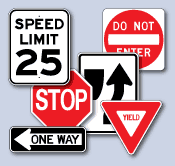 HB 339 increases the total hours of behind-the-wheel driving instruction a teen receives from 14 to 34 and creates an adult driver education requirement for applicants older than 18 and younger than 21.
HB 339 increases the total hours of behind-the-wheel driving instruction a teen receives from 14 to 34 and creates an adult driver education requirement for applicants older than 18 and younger than 21.
SB 1317 creates a six-hour driver education course required for driver license applicants 18 years of age or older. It also mandates that applicants 25 or under must submit to an approved driver education course. (Goes into effect March 1, 2010.)
SB 328 gives DPS the power to suspend a minor’s driver license if they fail a breath or blood alcohol test while operating a watercraft. Chapter 524 of the Transportation Code also clearly defines the suspension period for an individual who was under the age of 21 at the time when the offense of boating under the influence or driving under the influence of alcohol occurred. The law also increases the reinstatement fee for a license suspended under sections 49.04-49.08, Penal Code from $50 to $100.
HB 2730 increases the driver license sanction from a one-year CDL license disqualification to a lifetime disqualification if a person uses a motor vehicle to transport, conceal or harbor an alien. If a child is engaged in conduct involving a severe form of trafficking persons, a judge at a juvenile hearing is required to order the juvenile’s driver license or permit to be suspended.
HB 2730 prohibits DPS from issuing a driver license or identification card to a person who has not established a domicile in Texas. The law specifies that an applicant may receive a driver license at a post office box only if the applicant’s residence address has also been provided, with some exceptions.
Crime:
HB 558 allows minors to be charged with public intoxication.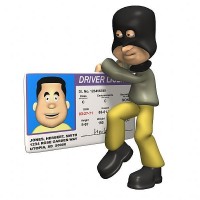
HB 2386 allows courts to immediately seal juvenile criminal records if the juvenile successfully completes a drug court program, or another special program ordered by the court.
HB 1282 makes it a Class B misdemeanor to steal a driver license, commercial driver license or personal identification.
SB 554 makes it illegal to own or possess dog-fighting equipment and establishes that such equipment and property where dogs are found to be engaged in dog fighting is contraband and is subject to forfeiture. The law also makes dog-fighting subject to the elevated penalties authorized in the Texas Penal Code, Section 71.02(a), in an effort to deter organized criminal activity.
HB 1813 makes it a third-degree felony to tamper with forensic, medical, chemical, toxicological and ballistic reports, as well as reports of certification, inspection or maintenance of instruments used to examine or test physical evidence. (Currently, someone who does this can only be charged with a state jail felony.)
HB 358 allows law enforcement authorities to store only a small part of gambling machines that have been seized, instead of storing the whole machine. They would be able to remove and store just the computer chips in gambling machines, which are the core of the machines and contain the information necessary for prosecutions to go forward.
Registered sex offenders:
SB 689 restricts Internet usage by certain registered sex offenders, and requires registered sex offenders to provide information about their e-mail addresses when they register.
Motorcycles etc.:
SB 1967 requires that applicants for an original class M license or class A, B or C driver license (including commercial driver licenses and permits) with authorization to operate a motorcycle, provide evidence of completion of an approved motorcycle operator training course. The law also increases the penalty for failure to yield the right-of-way if there is a crash that results in injury to a person other than the motorcycle operator.
Vehicle inspection:
SB 589 requires that a vehicle equipment safety compliance label be placed on a windshield, side or rear window stating that the window tinting complies with the appropriate provisions of the Transportation Code. Failing to place the required label on the vehicle could lead to a $1,000 fine.
Miscellaneous:
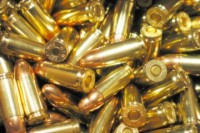 HB 2730 increases the fine for a parking violation at the state Capitol from $10 to $25, and increases the late fee from $2 to $5.
HB 2730 increases the fine for a parking violation at the state Capitol from $10 to $25, and increases the late fee from $2 to $5.
SB 1188 authorizes a Texas resident to buy firearms, ammunition or firearms accessories in any other state, not just those contiguous to Texas, to reflect updated federal statutes.
* Please keep in mind that this is not a complete list of all laws passed in the past legislative session.
### (PIO 2009-40)
